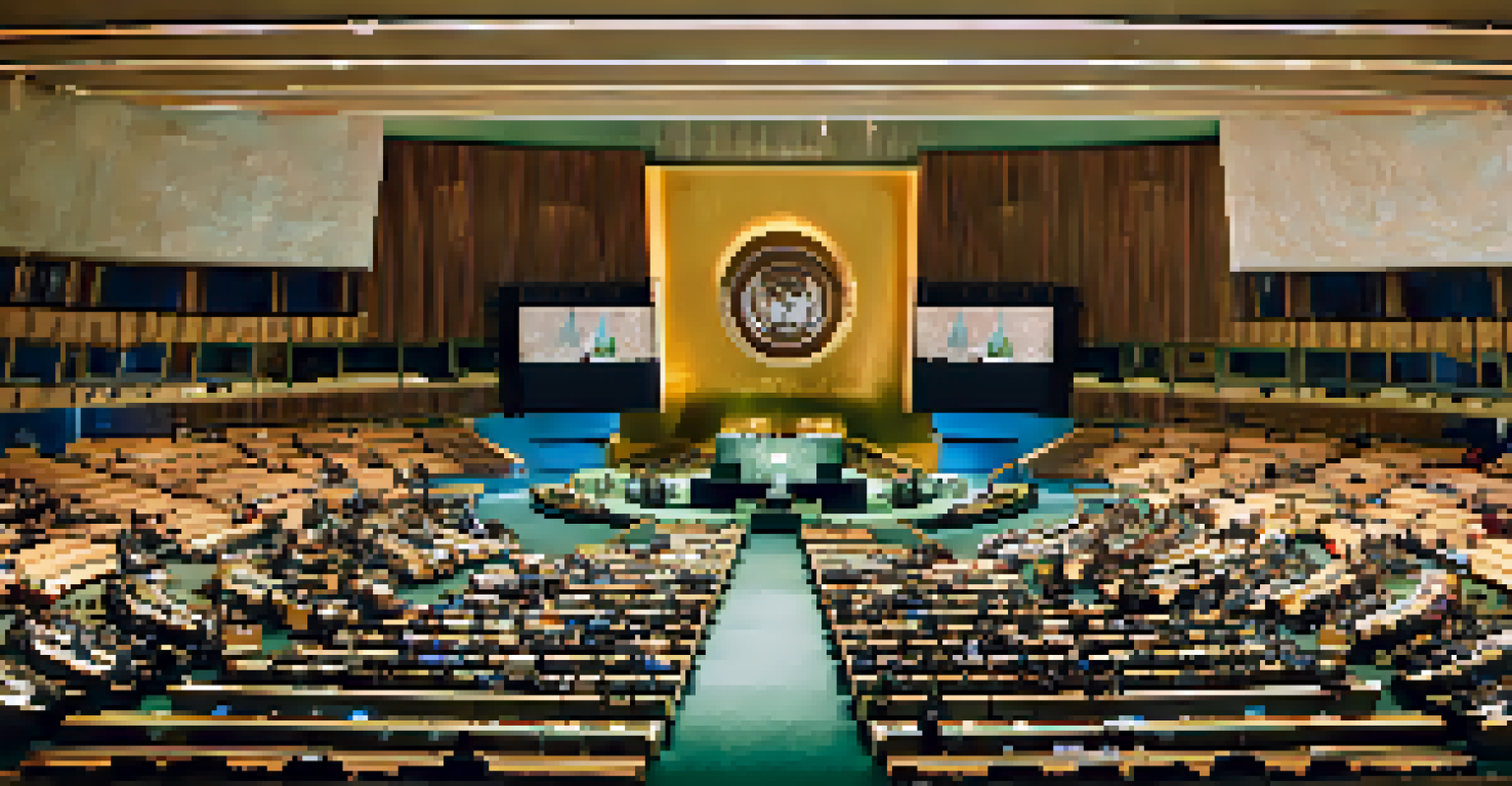The United Nations: New York City's Center for Global Diplomacy

An Overview of the United Nations in New York City
The United Nations (UN) is an international organization founded in 1945. Headquartered in New York City, it serves as a hub for global diplomacy, where countries come together to tackle pressing global issues. With its iconic building overlooking the East River, the UN symbolizes hope for peace and cooperation among nations.
The United Nations is our one great hope for a peaceful and free world.
New York City was chosen as the UN's home due to its accessibility and the city’s reputation as a melting pot of cultures. This unique setting allows diplomats from all over the world to meet and collaborate, making it a vibrant center for international relations. The UN's location in NYC also reflects the city's status as a global leader in finance, culture, and politics.
From peacekeeping missions to humanitarian aid, the UN plays a crucial role in addressing challenges such as poverty, climate change, and human rights violations. Its presence in New York City not only enhances the city’s global stature but also enables it to be at the forefront of international dialogue and action.
The Role of the General Assembly
At the heart of the UN’s operations is the General Assembly, where all member nations have a voice. This body meets annually to discuss important global issues, from disarmament to sustainable development. Each country, regardless of size or power, gets one vote, emphasizing the principle of equality among nations.

The General Assembly is more than just a meeting place; it’s a platform for diplomacy and negotiation. Here, countries can build alliances, propose resolutions, and engage in dialogue to resolve conflicts. This democratic process fosters collaboration and understanding, essential for a peaceful international community.
UN Headquarters: A Global Hub
The United Nations in New York City serves as a pivotal center for international diplomacy, addressing crucial global issues through collaboration.
In recent years, the General Assembly has tackled pressing issues like climate change, health crises, and social justice. By bringing together diverse perspectives, it plays a pivotal role in shaping global policies that impact everyone, making it a cornerstone of international diplomacy.
Security Council: The Power of Decision-Making
The UN Security Council (UNSC) is tasked with maintaining international peace and security. Comprising 15 members, including five permanent members with veto power, it plays a crucial role in addressing conflicts and crises worldwide. The UNSC can impose sanctions or authorize military intervention, making its decisions impactful.
In a world where we are increasingly interconnected, we need the United Nations to help us address global challenges together.
The dynamics within the Security Council can be complex, as the interests of powerful nations often influence outcomes. However, this body also provides a forum for diplomacy, where negotiations can lead to peaceful resolutions. The discussions held here are vital in preventing escalation and fostering stability.
In recent years, the UNSC has dealt with issues ranging from terrorism to nuclear proliferation. Its actions are closely monitored globally, showcasing the delicate balance between power and responsibility in maintaining peace. The Security Council exemplifies the challenging yet essential nature of global diplomacy.
UN Agencies and Programs: Tackling Global Challenges
The UN is not just one entity; it comprises various specialized agencies and programs dedicated to specific issues. Organizations like UNICEF, WHO, and UNESCO work tirelessly to address health, education, and humanitarian needs worldwide. Each agency plays a distinct role in fostering development and improving lives.
These agencies often collaborate on projects, pooling resources and expertise to tackle multifaceted challenges. For example, during health crises, WHO leads the charge while UNICEF provides crucial support for vulnerable populations. This synergy exemplifies how the UN operates as a comprehensive network for global good.
General Assembly: Voice of Nations
The General Assembly provides a democratic platform where all member states can discuss global challenges and propose solutions, emphasizing equality among nations.
With goals aligned to the Sustainable Development Goals (SDGs), these agencies aim to eradicate poverty, promote gender equality, and combat climate change. Their work underscores the UN’s commitment to building a better, more equitable world, making it a vital player in global diplomacy.
Cultural Significance of the UN Headquarters
The UN Headquarters is not just a center for diplomacy; it is also a cultural landmark. Opened in 1945, its architecture and artwork reflect the ideals of peace, unity, and diversity. Visitors from around the world come to admire the building and learn about its mission, showcasing the UN's global impact.
The complex features art installations and gifts from member states, symbolizing international collaboration. For instance, the famous 'Knotted Gun' sculpture serves as a powerful reminder of the importance of peace and non-violence. Such artistic representations enhance the cultural richness of the UN and foster a sense of shared responsibility.
Moreover, the UN often hosts events, exhibitions, and discussions that promote cultural exchange and understanding. By engaging the public in its mission, the UN strengthens its ties with communities, reinforcing the idea that global diplomacy is a collective endeavor involving everyone.
Educational Opportunities at the UN
The UN offers a range of educational programs aimed at raising awareness about global issues. Through initiatives like the Model United Nations, students can simulate UN proceedings, gaining firsthand experience in diplomacy and international relations. This hands-on approach encourages critical thinking and fosters a new generation of global leaders.
Additionally, the UN provides resources and materials for educators and students, promoting understanding of the UN’s work and its impact on the world. Workshops, seminars, and online courses allow individuals to engage deeply with topics such as human rights, sustainable development, and conflict resolution.
UN Agencies: Addressing Global Needs
Various UN agencies work collaboratively to tackle specific global challenges, focusing on health, education, and humanitarian efforts aligned with the Sustainable Development Goals.
By investing in education, the UN cultivates informed citizens who are equipped to tackle global challenges. These educational programs not only empower individuals but also emphasize the importance of collective action in achieving a more peaceful and just world.
The Future of the UN in Global Diplomacy
As the world faces unprecedented challenges—from climate change to geopolitical tensions—the UN’s role in global diplomacy is more critical than ever. Adapting to new realities and emerging threats requires innovative approaches and a commitment to multilateralism. The UN must continue to foster dialogue and collaboration among nations to address these pressing issues effectively.
Future initiatives may focus on enhancing the UN’s capacity to respond to crises swiftly and effectively. This includes strengthening partnerships with regional organizations and civil society, ensuring that diverse voices are heard in the decision-making process. By embracing inclusivity, the UN can address the root causes of conflict and promote sustainable peace.

Ultimately, the future of the UN hinges on its ability to evolve and respond to a rapidly changing world. By remaining true to its founding principles of unity and cooperation, the UN can continue to serve as a beacon of hope for global diplomacy, inspiring collective action towards a better future for all.